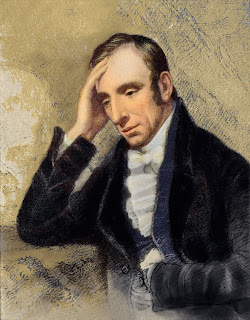Introduction by Amy Wilcockson
Whenever I see a little yellow-headed sunny daffodil, whether it is planted in someone’s garden waving to and fro in the wind, or displayed in a supermarket, it is inevitable that I think of one man. I suspect that many people do. William Wordsworth (1770-1850), the epitome of the Romantic poet, shall be forever linked with this small commonplace flower, and remembered for his astounding descriptions of the Lake District and natural world.
Alongside his friend, Samuel Taylor Coleridge, Wordsworth reshaped poetry. In a contrast to the more formal Augustan poetry of the late eighteenth century, Wordsworth’s poetry was fluid, and his subject matters that of nature, emotions based on real life, and normal people. Wordsworth and Coleridge’s 1798 poetical collection Lyrical Ballads was seen as an experiment, an insight into how real, working-class people spoke and thought. The new and innovative poetical ideas contained in this volume and Wordsworth’s shrewd nature as he sought to retain ownership of his poems meant that he had a modern idea of authorship, which culminated in large sales of his works. A pinnacle of his career came in 1843, when he was awarded the post of poet laureate, although many would consider his posthumously published poem The Prelude his greatest literary achievement. Autobiographical and in blank verse, the piece records Wordsworth’s own thoughts, ambitions, and fears.
Wordsworth’s legacy also stretches to the heritage world, with the Lake District containing no fewer than four heritage attractions linked to the poet: Wordsworth House and Garden (his childhood home), Allan Bank (where the Wordsworth family moved in 1808), Rydal Mount (where Wordsworth lived until his death), and of course, Dove Cottage (now known as Wordsworth Grasmere following a £6.5 million reimagining), where the poet wrote many of his famous works. Until 29 May 2022, it is possible to see the ‘I wandered lonely as a Cloud’ manuscript on display at Wordsworth Grasmere for the first time – a chance to see his poetry in the flesh!
To celebrate the 252nd birthday of William Wordsworth on 7th April, we have collated a few of the poet’s greatest verses for your enjoyment! So sit outside in nature, grab a cup of tea, read, and relax.
1. To A Butterfly
I've watched you now a full half-hour;
Self-poised upon that yellow flower
And, little Butterfly! indeed
I know not if you sleep or feed.
How motionless!--not frozen seas
More motionless! and then
What joy awaits you, when the breeze
Hath found you out among the trees,
And calls you forth again!
This plot of orchard-ground is ours;
My trees they are, my Sister's flowers;
Here rest your wings when they are weary;
Here lodge as in a sanctuary!
Come often to us, fear no wrong;
Sit near us on the bough!
We'll talk of sunshine and of song,
And summer days, when we were young;
Sweet childish days, that were as long
As twenty days are now.
________________________
STAY near me--do not take thy flight!
A little longer stay in sight!
Much converse do I find in thee,
Historian of my infancy!
Float near me; do not yet depart!
Dead times revive in thee:
Thou bring'st, gay creature as thou art!
A solemn image to my heart,
My father's family!
Oh! pleasant, pleasant were the days,
The time, when, in our childish plays,
My sister Emmeline and I
Together chased the butterfly!
A very hunter did I rush
Upon the prey:--with leaps and springs
I followed on from brake to bush;
But she, God love her, feared to brush
The dust from off its wings.
2. A Slumber Did My Spirit Seal
In celebration of Earth Hour March 26th
A slumber did my spirit seal
I had no human fears:
She seemed a thing that could not feel
The touch of earthly years.
No motion has she now, no force;
She neither hears nor sees;
Rolled round in earth's diurnal course,
With rocks, and stones, and trees.
3. There Was A Boy
There was a Boy; ye knew him well, ye cliffs
And islands of Winander! many a time,
At evening, when the earliest stars began
To move along the edges of the hills,
Rising or setting, would he stand alone,
Beneath the trees, or by the glimmering lake;
And there, with fingers interwoven, both hands
Pressed closely palm to palm and to his mouth
Uplifted, he, as through an instrument,
Blew mimic hootings to the silent owls
That they might answer him.—And they would shout
Across the watery vale, and shout again,
Responsive to his call,—with quivering peals,
And long halloos, and screams, and echoes loud
Redoubled and redoubled; concourse wild
Of jocund din! And, when there came a pause
Of silence such as baffled his best skill:
Then, sometimes, in that silence, while he hung
Listening, a gentle shock of mild surprise
Has carried far into his heart the voice
Of mountain-torrents; or the visible scene
Would enter unawares into his mind
With all its solemn imagery, its rocks,
Its woods, and that uncertain heaven received
Into the bosom of the steady lake.
This boy was taken from his mates, and died
In childhood, ere he was full twelve years old.
Pre-eminent in beauty is the vale
Where he was born and bred: the churchyard hangs
Upon a slope above the village-school;
And through that churchyard when my way has led
On summer-evenings, I believe that there
A long half-hour together I have stood
Mute—looking at the grave in which he lies!




Comments
Post a Comment